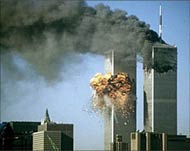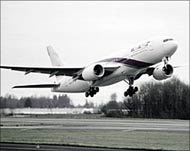The 9/11 backlash of bigotry
Two years after the devastation of the September 11 attacks, Arab-Americans, Arab immigrants and Muslims in the United States still suffer a backlash of bigotry.

Just four days after the attacks, amid a sometimes violent reaction against Arabs and Muslims across the country, President George Bush visited the Islamic Center of Washington to declare that such hate crimes were unacceptable and un-American.
“Those who feel they can intimidate our fellow citizens to take out their anger don’t represent the best of America and they should be ashamed of themselves,” said Bush.
But any shame was either short-lived or in short supply.
In March 2003, an 18-year-old Arab-American was brutally beaten in Yorba Linda, California by a mob of individuals shouting white supremacist slogans.
Around the same time, a man in Brooklyn, New York killed four shopkeepers whom he believed to be Arab Muslims, although only one of them turned out to be of Middle Eastern descent.
And recently, an Indian resident of Queens, New York was savagely attacked by a group of drunken hoodlums who mistook him for an Arab.
The 9/11 legacy
According to a comprehensive hate crimes report published by the Arab-American Anti-Discrimination Committee (ADC) toward the end of 2002, the bitter legacy of 9/11 lived on.
“In spite of numerous expressions of support for the community from public figures and thousands of private citizens, Arab-Americans remain exceptionally vulnerable to hate crimes, discrimination and extreme vilification by prominent persons,” said the report. It added that the civil rights and liberties of Arab-Americans had suffered severely.
|
“… Arab-Americans remain exceptionally vulnerable to hate crimes, discrimination and extreme vilification …” |
American-Arabs and Muslims still face two types of discrimination: one based on culture, the other fuelled by the US government and the war on terrorism, said Hussein Ibid, an ADC spokesman.
The cultural hostility involves the practice of hate crimes, employment discrimination and a wave of social misinformation permeating the airwaves, schools and street corners of the US. This problem can affect anyone who merely looks Arab or Muslim, whether they are US citizens or not.
Meanwhile, the Bush administration has instituted a series of policies aimed at cracking down on Arab immigrants and terrorism suspects that have destroyed the lives of scores of innocent people, Arab and Muslim civil rights leaders say.
Hate crimes
Since 11 September 2001, there has been a 1700% increase in reported hate crimes against Arabs and Muslims in the US, according to a report published by Human Rights Watch in November 2002.
The eye of the storm occurred in the first nine weeks after the attacks, during which time ADC received roughly 700 confirmed cases of violence directed against Arab Americans.
 |
|
Hate crimes against Muslims and |
“There was a spasm of violence and then a settling down to double what [hates crimes] were before,” Ibid said.
These crimes ranged from severe beatings to vandalism to cases of arson. So far this year, ADC has received about 90 complaints from individuals who have been targeted, he said.
There has also been a four-fold increase in the number of discrimination cases against Arabs and Muslims in the work place, he said. These reports have maintained a steady pace for the last two years, and include charges of unwarranted firings, demotions, harassment and unfair hiring practices.
Ethnic profiling
Ibid said an even greater and more insulting phenomenon since 11 September, has been the profiling of Arab and Muslim passengers during airport security screenings.
While the pre-boarding procedures have improved, many Arab-looking passengers faced another problem once they made it onto the plane.
“What we’ve seen instead is the emergence of a large number of people having been taken off planes after boarding, but before take off, because of passengers and employees who don’t like their looks,” Ibid said.
 |
|
Some Arab-looking passengers |
Both the ADC and the US Department of Justice (DOJ) filed a lawsuit against several of the airlines that allowed these race-based interdictions to occur, resulting in a measurable decrease in the problem.
“I think airlines are now cautious about repeating this,” Ibid said.
Ironically, while the ADC has praised the efforts of the government in combating what Ibid calls “hate crimes by non-state actors”, agencies such as the Justice Department and the FBI have initiated a number of discriminatory polices directed at immigrants from the Middle East, he said.
Immigration crackdown
Muslim civil rights groups such as the Council on American-Islamic Relations (CAIR) say the government’s actions have inflamed an already dangerous situation.
“We’re getting it from both sides,” said Ibrahim Hooper, a CAIR spokesman. “We’re getting it from anti-Muslim bigots, but also from government policies.”
The Immigration and Naturalisation Service (INS), now part of the Department of Homeland Security, created the National Security Entry-Exit Registration System (NSEERS) last year, in which thousands of non-permanent residents from mainly Arab countries were forced to register themselves and submit to fingerprinting.
|
“We’re getting it from both sides. We’re getting it from anti-Muslim bigots, but also from government policies” Ibrahim Hooper, |
In addition, the Justice Department, under Attorney General John Ashcroft, engaged in a massive crackdown against immigrants who have violated their visa status, many of them based on minor technicalities. Not coincidentally, increased government efforts to deport these violators have been aimed at Arab immigrants, Ibid said.
“Basically, the INS, under Ashcroft, post-9/11, adopted an attitude that if you’re an Arab immigrant with any visa problems whatsoever, you will be deported,” he said.
That attitude has also affected many Muslims in general. Ibid gave the example of Ansar Mahmud, a Pakistani immigrant who was detained just after September 11 on suspicious of links to terrorism.
Though the grounds for his imprisonment were never substantiated and he was never charged with a terrorist-related crime, he is still in detention to this day. He has since been accused of helping two friends with visa violations find an apartment.
The Justice Department, which did not return telephone calls for this story, has provided no word on when he might be deported or released.
Destroying lives
Adam Carroll, a spokesman with the Islamic Circle of North America, a New York-based organization, said the government cast the net of immigration reform so wide, that many law-abiding Arab and Muslim residents have had their lives, and that of their families, permanently damaged.
“With a lot of people, the government throws around allegations of links to terrorism that are unfounded, and meanwhile the detainees are demoralised and frightened, and their families spend all their money on legal fees,” Carroll said.
He estimated that of the nearly 100,000 immigrants who have been registered under the NSEERS programme, roughly 13,000 still have deportation cases pending today. The vast majority of those individuals, mostly Arabs and South Asians, will be forced to leave the country and the life they came to build, he said.
|
“I would get emails that said ‘why don’t you go back where you came from you Arab dog’ ” James Zogby, |
The DOJ has been reticent with information on the status of these detainees. Only a select few are known to have been charged with terrorist-related offences.
Some had been detained so long that their visas, which were still valid before they were picked up, expired while they were in detention – a technicality that did not prevent the government from moving to deport them, Carroll said.
James Zogby, president of the Arab-American Institute, said that Attorney General Ashcroft’s policies cast such a large cloud of suspicion over the Arab community after 11 September, that his organization was vilified by many individuals any time it even attempted to question the legitimacy of the government’s actions.
“I would get emails that said ‘Why don’t you go back where you came from you Arab dog?’ ” he said.
Bush losing Arab vote
Recent poll numbers show all this could hurt the Bush administration in next year’s presidential election. A Zogby poll in July showed Arab-American support for Bush dropped from 45% in 2000, to just 33%.
“I think his numbers are down in general and especially in our community, and are going to stay that way,” Zogby said.
Whether or not such a decline will have a significant impact on Bush’s re-election campaign is unclear, but Hooper said the issue of discrimination will be at the top of the political agenda for many Arab and Muslim voters.
“I think, obviously, Muslims and Arab-Americans are going to pick their candidates based on issues that affect their lives and obviously civil rights is a big issue for them,” he said.
What is clear is that nearly two years after September 11, many Arabs and Muslims in the US, immigrants or citizens, are still uncertain about what the future holds in store for them.
“I think it’s too soon to tell whether things are going to get worse or get better,” said Hooper.